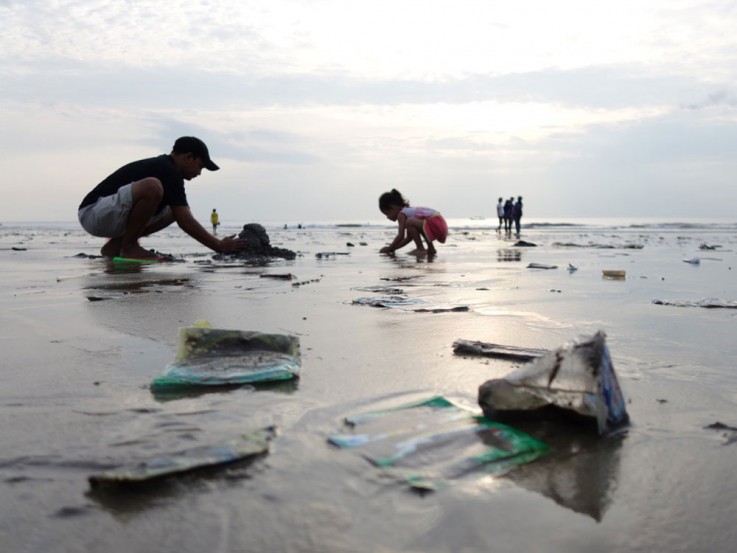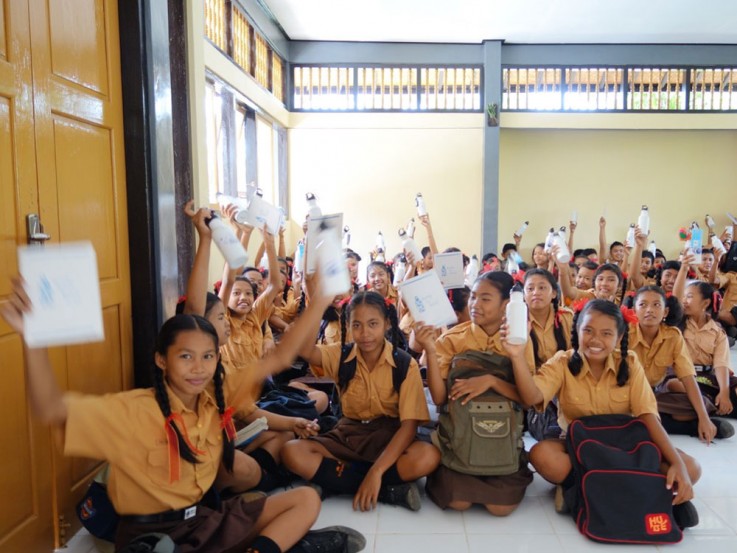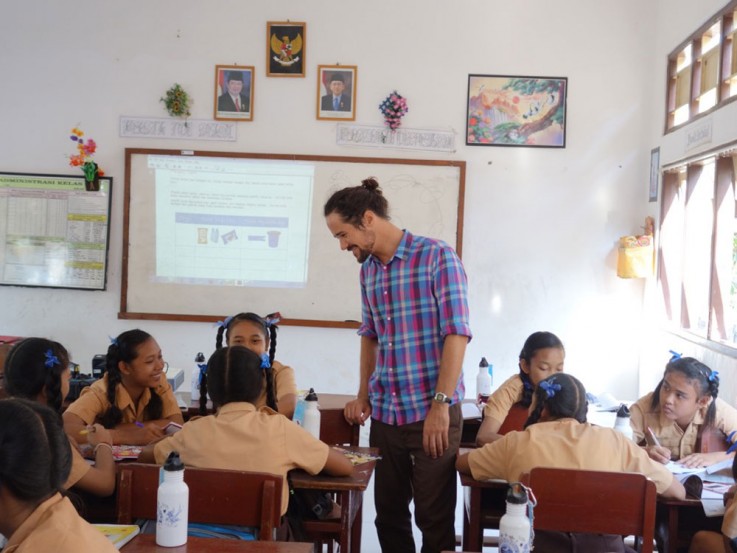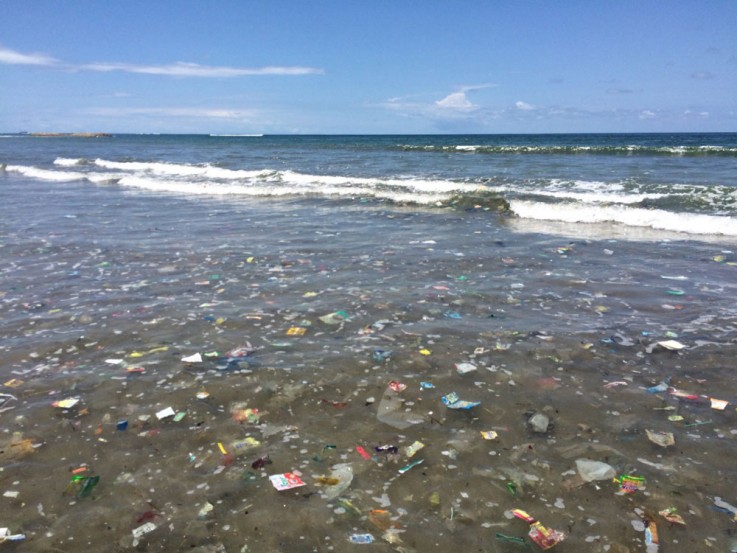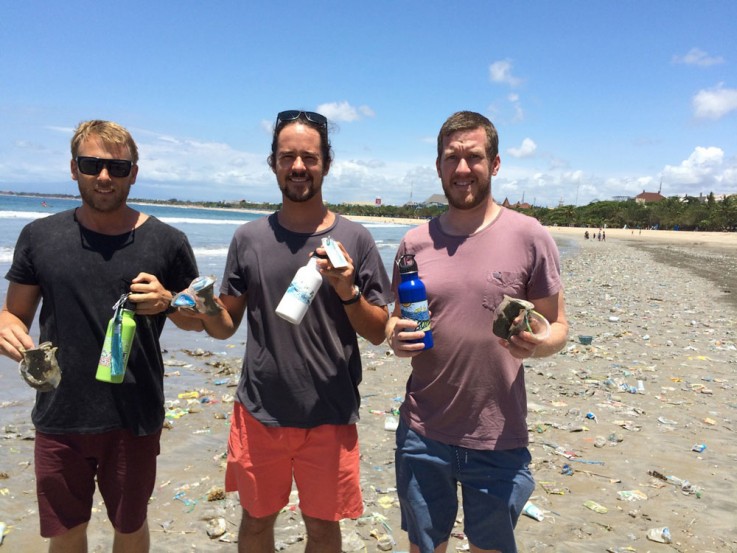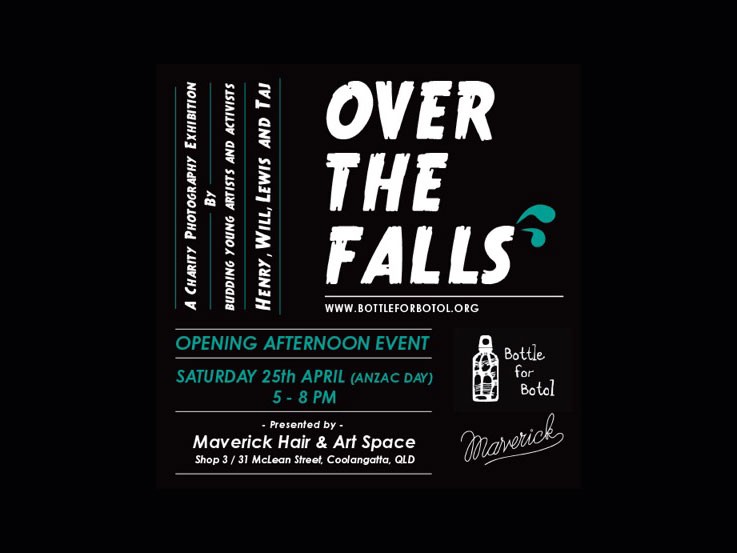Combating the Plastics Problem in Indonesia
Surfers Charging for Change Series:
Combating the Plastics Problem in Indonesia, One Bottle at a Time
While volunteering in Bali, Christine Parfitt and Chris Kemp conceived the idea of Bottle for Botol - a not-for-profit organisation focused on combating single-use plastics consumption. Environmental Education Program Coordinator, Mitch Longhurst, spoke to us about their work and why he believes surfers should be playing a key role in sustainability.
How did the organisation come about?
Christine was working for a turtle conservation organisation and Chris a community radio station when they saw firsthand how bad the plastics situation was in Bali. Following a chance meeting with a local junior high school teacher, Pak Yasa, who’d been running his own environmental club within the school, the concept for Bottle for Botol evolved.
What does Bottle for Botol do?
We partner schools in Indonesia and Australia and engage them in a water bottle exchange. We provide students in Bali with stainless steel water bottles that can be refilled from new water dispensers set up in their school canteen. This replaces the single-use plastic cups currently being used, lessens the impact of plastics on the environment and reduces the cost of clean drinking water. The bottles feature artwork designed by the kids and are sold in the Australian schools and online. For every bottle sold one is sent to a student in Bali. We organise delivery and set up refill stations in the schools. Before we distribute the bottles the kids complete an eight-week environmental education program, developed by Christine and delivered by the local teachers. We also encourage the partner schools to interact and learn about each other’s culture, which they do through Skype and email.
How did you get involved with Bottle for Botol?
I studied Urban and Environmental Planning at university and worked in town planning and environmental planning at Gold Coast Council for about five years. I’d also completed a volunteer assignment for Australian Volunteers for International Development (AVID) in Vietnam working for a Dutch non-governmental-organisation running a sustainable coffee program. When I returned to Australia I saw a role advertised on the AVID website. It was a dream job based on my background, experience and personal interests - being a surfer and travelling all over the world it’s devastating to see the impact of plastic waste on the beach. I was struck by what a simple and effective program Christine and Chris had designed, so I put in an application and was lucky enough to get the job.
Who else is involved?
The organisation comprises a number of volunteers. Two are based in Melbourne with Chris - Samantha Ferrier looks after the Australian schools and Alison Capp is in charge of monitoring and evaluation. Cassidy Fitzclarence, another volunteer, is based in the Northern Territory and manages our corporate partnerships. Christine is in Perth and I work between Bali and the Gold Coast, where one of our partner schools Saint Stephen’s College is located. In a small not-for-profit like ours, everyone does a bit of everything and while it can be a challenge being in different locations we make it work. We also partner with different organisations in Indonesia – one is Pusat Pendidikan Lingkungan Hidup (PPLH) the Environmental Education Centre. PPLH have 17 years’ experience running education programs in Bali and are helping coordinate the program in Kuta and Denpasar. We’ve been really lucky to partner with PPLH, our work would be impossible without them. We are also fortunate to be working with Yayasan Winsnu an organisation that promotes environmental community-based tourism in Bali.
What’s the most challenging aspect of your work?
I’m based in Indonesia so the cultural differences can be challenging, especially in terms of trying to work out time frames and plan things. Classic Indonesian ‘rubber time’ is great when you’re on holiday but when you’re trying to coordinate Australian school terms it can be really challenging. The obvious language barrier is also a big one. Fortunately the people that I work with want to practice their English so it’s been a mutual learning process.
What makes it all worthwhile?
My long-term goal was always to work in a developing country and on environmental issues because I saw it as important and something that interests me. Doing work on the ground has been challenging but an exciting and a cultural learning process. It’s also really rewarding personally, you get such insight into another culture and meet so many amazing people. This role, especially as a surfer, is a really good fit for me.
What role do you think surfers should play when it comes to sustainability?
As surfers we get so much enjoyment from the ocean and the beautiful places we go to surf. The surf industry also makes a lot of money from this essentially free resource, so I believe we have an obligation to give something back, to try and protect these places and look after it [the environment] as much as possible. There’s a growing awareness amongst surfers that this is something that we should do, but it’s good that it’s now getting more attention.
How can others get involved or support Bottle for Botol?
The easiest thing to do is to jump onto our website and Facebook page and see what we’re doing – talk about it, share it with friends and start a discussion about the issue of single-use plastics. To support us directly people can buy a bottle through our website or make a donation. If schools are interested in getting involved there is also information about how to do that. There is a fundraising photographic exhibition ‘Over The Falls’ being held on the Gold Coast by four young surfers raising money Bottle for Botol, so you can also support that. There are lots of different avenues but the most important thing is getting the dialogue going.
Where can we find you online?
| Web: | bottleforbotol.org |
| Facebook: | facebook.com/BottleforBotol |
| Twitter: | @BottleforBotol |
To learn more about their supporters:
| ‘Over the Falls’: | facebook.com/beamaverick.coolangatta |
| Environmental Education Centre: | pplhselo.or.id |
| Yasa Winsnu: | wisnu.or.id |
| AVID: | volunteering.scopeglobal.com |
Surfers Charging for Change Series
This article is the second in a series that we are penning highlights some of the leaders in sustainable surfing practices and showcases the inspiring efforts of surfers around the globe tackling issues including; the eradication of plastics, clean water, empowerment through education and enabling greater access for surfers with disabilities, just to name a few. Stay tuned for the next instalment...
Surfers Charging for Change - Introduction
Surfers Charging for Change - Boomerang Bags - Sewing Sustainable Solutions
Posted by: Jaclyn Knight, on April 27, 2015
Categories: Interviews
Latest Posts
Craig Sims - White Horses & Surfing Life Publisher
Luke Kennedy - Editor of Tracks Magazine
Simon ‘Swilly’ Williams - Surf Photographer
Jarra Campbell - the Bondi Alchemist
Greg Gordon - Owner of CR Surf
Shayne Nienaber - Surf Photographer
Alexa Hohenberg - Owner of Still Stoked
Christine Deveney - TapaReef Owner & Creator
Russell Ord - Surf Photographer
Richard Kotch - Surf Photographer
Categories
Interviews
Articles
Videos
Press Releases
Quiz
Archive
December 2018
November 2018
October 2018
September 2018
August 2018
July 2018
June 2018
May 2018
April 2018
March 2018
February 2018
January 2018
November 2017
January 2017
December 2016
November 2016
October 2016
September 2016
August 2016
July 2016
June 2016
May 2016
April 2016
March 2016
February 2016
January 2016
December 2015
November 2015
October 2015
September 2015
August 2015
July 2015
June 2015
May 2015
April 2015
March 2015
February 2015
January 2015
December 2014
November 2014
October 2014
September 2014
August 2014
July 2014
June 2014
May 2014
April 2014
March 2014
February 2014
January 2014
December 2013
November 2013
October 2013
September 2013
August 2013
July 2013
June 2013
May 2013
April 2013
March 2013

